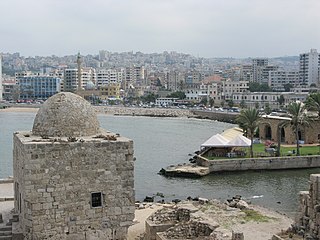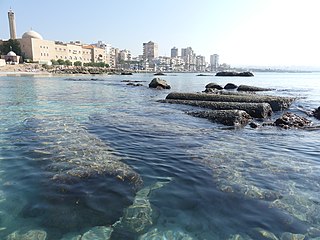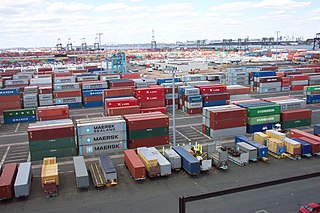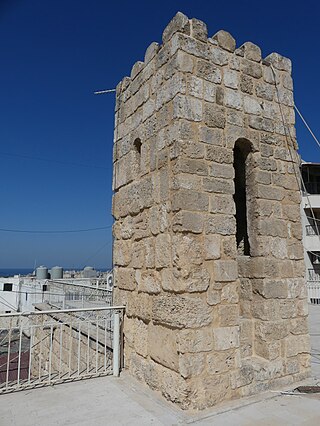
Sidon or Saida is the third-largest city in Lebanon. It is located on the Mediterranean coast in the South Governorate, of which it is the capital. Tyre, to the south, and the Lebanese capital of Beirut, to the north, are both about 40 kilometres away. Sidon has a population of about 80,000 within the city limits, while its metropolitan area has more than a quarter-million inhabitants.

Tyre is a city in Lebanon, one of the oldest continuously inhabited cities in the world, though in medieval times for some centuries by just a small population. It was one of the earliest Phoenician metropolises and the legendary birthplace of Europa, her brothers Cadmus and Phoenix, as well as Carthage's founder Dido (Elissa). The city has many ancient sites, including the Tyre Hippodrome, and was added as a whole to the list of UNESCO World Heritage Sites in 1984. The historian Ernest Renan noted that "One can call Tyre a city of ruins, built out of ruins".

Containerization is a system of intermodal freight transport using intermodal containers. Containerization, also referred as container stuffing or container loading, is the process of unitization of cargoes in exports. Containerization is the predominant form of unitization of export cargoes, as opposed to other systems such as the barge system or palletization. The containers have standardized dimensions. They can be loaded and unloaded, stacked, transported efficiently over long distances, and transferred from one mode of transport to another—container ships, rail transport flatcars, and semi-trailer trucks—without being opened. The handling system is mechanized so that all handling is done with cranes and special forklift trucks. All containers are numbered and tracked using computerized systems.

The 1982 Lebanon War began on 6 June 1982, when Israel invaded Lebanon. The invasion followed a series of attacks and counter-attacks between the Palestine Liberation Organization (PLO) operating in southern Lebanon and the Israeli military that had caused civilian casualties on both sides of the border. This was the second Israeli invasion of Lebanon following the 1978 South Lebanon conflict.

A container ship is a cargo ship that carries all of its load in truck-size intermodal containers, in a technique called containerization. Container ships are a common means of commercial intermodal freight transport and now carry most seagoing non-bulk cargo.
The Port of London is that part of the River Thames in England lying between Teddington Lock and the defined boundary with the North Sea and including any associated docks. Once the largest port in the world, it was the United Kingdom's largest port as of 2020. Usage is largely governed by the Port of London Authority ("PLA"), a public trust established in 1908; while mainly responsible for coordination and enforcement of activities it also has some minor operations of its own.

The Port of Hong Kong located by the South China Sea, is a deepwater seaport dominated by trade in containerised manufactured products, and to a lesser extent raw materials and passengers. A key factor in the economic development of Hong Kong, the natural shelter and deep waters of Victoria Harbour provide ideal conditions for berthing and the handling of all types of vessels. It is one of the busiest ports in the world, in the three categories of shipping movements, cargo handled and passengers carried. This makes Hong Kong a Large-Port Metropolis.

The Amal Movement is a Lebanese political party and former militia affiliated mainly with the Shia community of Lebanon. It was founded by Musa al-Sadr and Hussein el-Husseini in 1974 as the "Movement of the Deprived." The party has been led by Nabih Berri since 1980. The Greek Catholic Archbishop of Beirut, Grégoire Haddad, as well as Mostafa Chamran, were among the founders of the movement.
The War of the Camps, was a subconflict within the 1984–1990 phase of the Lebanese Civil War, in which the Palestinian refugee camps in Beirut were besieged by the Shia Amal militia.

The Port of Beirut is the main port in Lebanon on the eastern part of the Saint George Bay on Beirut's northern Mediterranean coast, west of the Beirut River. It is one of the largest and busiest ports on the Eastern Mediterranean.

Zim Integrated Shipping Services Ltd., commonly known as ZIM, is a publicly held Israeli international cargo shipping company, and one of the top 20 global carriers. The company's headquarters are in Haifa, Israel; Founded in 1945, ZIM has traded on the New York Stock Exchange since 2021. From 1948 to 2004, it traded as ZIM Israel Navigation Company.

The Port of Ashdod is one of Israel's three main cargo ports. The port is located in Ashdod, about 40 kilometers south of Tel Aviv, adjoining the mouth of the Lachish River. Its establishment significantly enhanced the country's port capacity. It handles the largest volume of cargo containers annually of all Israeli ports. Ships carrying humanitarian aid for the Gaza Strip also unload their cargo at Ashdod.

The Port of Haifa is the largest of Israel's three major international seaports, the others being the Port of Ashdod, and the Port of Eilat. Its natural deep-water harbor operates all year long and serves both passenger and merchant ships. It is one of the largest ports in the eastern Mediterranean in terms of freight volume and handles about 30 million tons of cargo per year. The port employs over 1,000 people, rising to 5,000 when cruise ships dock in Haifa. The Port of Haifa lies north of Haifa's downtown quarter on the Mediterranean and stretches to some three kilometres along the city's central shore with activities ranging from military, industrial, and commercial next to a nowadays-smaller passenger cruising facility.
The Port of Montreal is a cruise and transshipment point. It is located on the St. Lawrence River in Montreal, Québec, Canada. The port operates as an international container port. It services Toronto, the rest of Central Canada, the Midwestern United States, and the Northeastern United States. Though found on the Saint Lawrence Seaway, it is some 1,600 miles (2,600 km) inland from the Atlantic Ocean and it is on the shortest direct route between the North American Midwest and Europe or the Mediterranean.
Since Norfolk serves as the commercial and cultural center for the geographical region of Hampton Roads, it can be difficult to separate the economic characteristics of Norfolk, from that of the region as a whole. The waterways which almost completely surround the Hampton Roads region also play an important part in the local economy. As a strategic location at the mouth of the Chesapeake Bay, its protected deep water channels serve as major arteries for the import and export of goods from across the Mid-Atlantic, Mid-West, and international destinations, as well as being the location of the world's largest naval base.

Burj el-Shemali is a municipality located some 86 km south of Beirut and 3 km east of the Tyre/Sour peninsula, merging into its urban area. It is part of the Tyre Union of Municipalities within the Tyre District of the South Governorate of Lebanon.

The Lebanese Resistance Regiments (Arabic: أفواج المقاومة اللبنانية, romanized: ʾAfwāj al-Muqāwama al-Lubnāniyya, or أَمَل AMAL), also designated Lebanese Resistance Battalions, Lebanese Resistance Detachments, Lebanese Resistance Legions and Battalions de la Resistance Libanaise (BRL), but simply known by its Arabic acronym أَمَل ʾAmal which means "Hope", were the military wing of the Amal Movement, a political organization representing the Muslim Shia community of Lebanon. The movement's political wing was officially founded in February 1973 from a previous organization bearing the same name and its military wing was formed in January 1975. The Amal militia was a major player in the Lebanese Civil War from 1975 to 1991. The militia has now been disarmed, though the movement itself, now known as the Amal Movement (Arabic: Harakat Amal), is a notable Shia political party in Lebanon.

During the 1982 Lebanon War, the city of Beirut was besieged by Israel following the breakdown of the ceasefire that had been imposed by the United Nations amidst the Lebanese Civil War. Beginning in mid-June, the two-month-long siege resulted in the expulsion of the Palestinian Liberation Organization (PLO) from Beirut and the rest of Lebanon.

Tyre, in Lebanon, is one of the oldest cities in the world, having been continuously inhabited for over 4,700 years. Situated in the Levant on the coast of the Mediterranean Sea, Tyre became the leading city of the Phoenician civilization in 969 BC with the reign of the Tyrian king Hiram I, the city of Tyre alongside its Phoenician homeland are also credited with numerous innovations in shipbuilding, navigation, industry, agriculture, and government. The Phoenician Tyrians' international trade network was based on its two ports and is believed to have fostered the economic, political, and cultural foundations of Classical Western civilization.

Sidon is one of the oldest inhabited cities in the world and has a rich and diverse history that spans over 6,000 years. The city's name has changed over time and has been known by various names, including Sidun, Saida, and Saïd. The earliest evidence of human settlement in the area dates back to the Neolithic period, around 4000 BCE. Sidon rose to prominence during the Bronze Age and became one of the most important city-states in the region. It was a major center for trade and commerce and played a significant role in the Mediterranean trade network. The city's strategic coastal location made it a hub for maritime activities.
















